英语16种时态结构归纳.doc
16种英语时态总结归纳及练习

时态专题讲解构成时态的助动词be (is, am, are), have (has), shall, will 等需根据主语的变化来选择。
时态是英语中一个重要的语法范畴,它表示不同时间发生的动作或存在的状态以及动作发生或存在的方式。
动作发生的时间可分为现在、过去、将来和过去将来四种形式,动作发生的方式可分为一般、完成、进行和完成进行四种形式。
将时间形式和动作方式结合起来,就构成了以下一般完成进行完成进行现在一般现在时do 现在完成时have done现在进行时is doing现在完成进行时have been doing过去一般过去时did 过去完成时had done过去进行时was doing过去完成进行时had been doing将来一般将来时will do 将来完成时will have done将来进行时will be doing将来完成进行时will have been doing过去将来过去将来一般时would do过去将来完成时would have done过去将来进行时would be doing过去将来完成进行时would have beendoing英语的时态是靠动词的变化和时间状语来表达的。
英语中的时态共有十六种,但是常考的或较常用的只有9种。
要掌握英语的时态和语态,必须掌握好英语中的助动词(do, be, have)和时间状语这两个核心问题。
一般现在时用法:A) 经常性、习惯性动作。
例:He always helps others. (他总是帮助别人。
)B) 客观事实和普遍真理。
尤其要注意,如果前后文不是一般现在时,则无法保持主句、从句时态一致He said lights goes faster than sound. 他说光比声音传播的快。
C) 表示一个按规定、计划或安排要发生的动作,(仅限于某些表示“来、去、动、停、开始、结束、继续”等的动词)可以与表示未来时间的状语搭配使用。
一般现在时--一般过去时---现在进行时--过去进行时归纳总结

一般现在时一般过去时现在进行时过去进行时1. 一般现在时(1)一般现在时的构成动词一般用原形,若主语为单数第三人称,则动词加词尾-s或-es,具体变化规则如下(与名词的单数变复数规则大致一样):1。
一般情况下由动词后加-s构成。
如:work→works 工作read→reads 读look→looks 看come→comes 来live→lives 居住listen→listens 听2.以s, x, z, sh, ch 以及字母o结构的动词,后加—es。
如:guess→guesses 猜mix→mixes 混和go→goes 去finish→finishes 完成catch→catches 抓住3.以辅音字母加y结尾的动词,应将y改为i 再加-es.如:fly→flies 飞行study→studies 学习carry→carries 带,扛一般现在时主要用动词的原形表示,如果主语是第三人称单数,则在动词原形式后加—s 或-es .如:Tom often helps his parents do housework at home。
汤姆在家经常邦助父母做家务。
Sometimes Lucy washes her clothes herself。
有时候露西亲自洗她的衣服。
(2)一般现在时的用法1)表示经常性或习惯性的动作或存在的状态。
与often ,always ,usually ,sometimes , once a week , every day 等表示频度的副词或时间状词连用.如:I often go to school by bike. 我经常骑自行车去上学。
2)表示客观事实或普遍真理。
如:The earth goes around the sun .地球绕着太阳转。
3)在时间、条件等状语从句中,用现在时表示将来。
如:If it rains tomorrow, we won't go to the park.如果明天下雨,我们就不去公园了。
时态语法经典总结

英语语法16种时态经典总结各时态结构及用法举例1. 一般现在时(do/does; is/am/are)①表示现在的情况、状态和特征。
例:He is a student.他是一个学生。
②表示经常性、习惯性动作。
例:He always helps others.他总是帮助别人。
③客观事实和普遍真理。
例:The earth moves the sun.地球绕着太阳转。
④表示一个按规定、计划或安排要发生的动作。
(常用于列车、客车、飞机或轮船时刻表)例:The next train leaves at 3 o'clock this afternoon.下一趟火车今天下午3点开车。
⑤主将从现:在时间、条件和让步状语从句中经常用一般现在表示将来的事情。
例:If it rains tomorrow, we will stay at home.如果明天下雨,我们会待在家里。
2. 现在进行时(am/is/are doing)①表示此时此刻正在发生的事情。
例:He is listning to the music now.他现在正在听音乐。
②表示目前一段时间内一直在做的事情,但不一定此时此刻正在做。
例:I am studying computer this term.这个学期我一直在学习计算机。
③现在进行时可以表示将来的含义。
瞬时动词的进行一定表将来。
例:I am leaving.我要离开了。
持续动词的进行只有有将来的时间状语或有将来语境中才表将来。
例:I am travelling next month.下个月我要去旅行。
④现在进行时与频度副词连用,表示说话者或褒义或贬义的感情色彩。
例:He is always helping others.他总是帮助别人。
(褒义)3. 过去进行时(was/ were doing)①表示在过去一个具体的时间正在发生的动作。
例:Mary was listening to light music 10 minutes ago.10分钟前,玛丽正在听轻音乐。
完整版)高中16种英语时态总结归纳
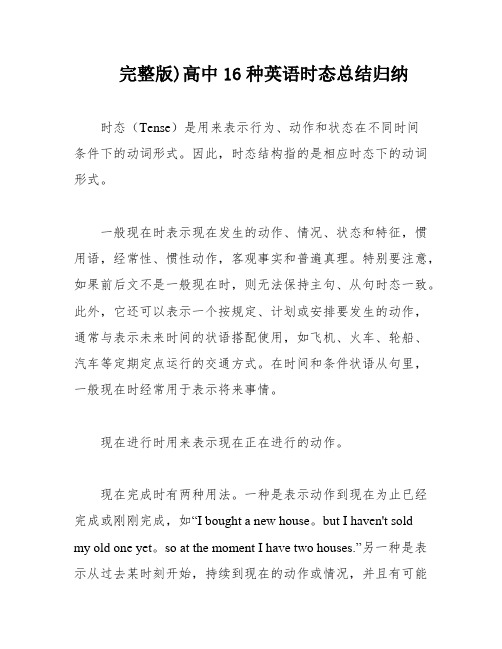
完整版)高中16种英语时态总结归纳时态(Tense)是用来表示行为、动作和状态在不同时间条件下的动词形式。
因此,时态结构指的是相应时态下的动词形式。
一般现在时表示现在发生的动作、情况、状态和特征,惯用语,经常性、惯性动作,客观事实和普遍真理。
特别要注意,如果前后文不是一般现在时,则无法保持主句、从句时态一致。
此外,它还可以表示一个按规定、计划或安排要发生的动作,通常与表示未来时间的状语搭配使用,如飞机、火车、轮船、汽车等定期定点运行的交通方式。
在时间和条件状语从句里,一般现在时经常用于表示将来事情。
现在进行时用来表示现在正在进行的动作。
现在完成时有两种用法。
一种是表示动作到现在为止已经完成或刚刚完成,如“I bought a new house。
but I haven't soldmy old one yet。
so at the moment I have two houses.”另一种是表示从过去某时刻开始,持续到现在的动作或情况,并且有可能会继续延续下去。
这时通常使用延续性动词,时间状语常用since加一个过去的时间点,或for加一段时间,或by加一个现在时间。
4.现在完成进行时 (have been doing)现在完成进行时用来描述一个从过去某一时间开始一直持续到现在的动作或状态,或将继续持续到未来。
例如:我们已经处理这个项目一个多月了,一直在进行中。
5.一般过去时一般过去时用来描述过去某个时间发生的动作或情况,或者过去的惯性动作。
例如:这位老人过去常常坐在公园的长椅上看着别人,一坐就是数个小时。
他以前总是每周看望他的母亲。
在句型中使用 "no sooner than"、"___"、"before"、"r to" 等连接词时,主句要求完成时。
例如:今天之前我从未见过那位教授。
在填空题中,句子中的动作已经持续了一段时间,并且需要进行修理。
初中英语知识归纳总结——动词的时态

初中英语知识归纳总结——动词的时态动词的时态(一)教学重点一般现在时在英语中,不同时间里以不同方式发生的动作或存在的状态,要用不同的动词形式来表示,动词的这种不同形式称为动词的时态。
时态从时间上划分,可分为四大类:现在时;过去时;将来时;过去将来时。
从行为上,每一类可以分为四种形式:一般式;进行式;完成式;完成进行式。
这样英语的动词合起来,总共有十六种时态,初中只需掌握其中的八种时态。
1、一般现在时(1)一般现在时表示现在的状态、习惯性的动作或主语所具备的性格和能力等。
①当动词是be时,第一人称用am,第二人称用is,其他人称用are.②当动词是实义动词时,一般用动词原形,但如果主语是第三人称单数时,动词必须用第三人称单数形式,其变化规则如下:助动词do(第三人称单数用does)构成否定句、疑问句及答语,但要注意助动词后原来的谓语动词要恢复原形。
例如:I like music.I don’t like music.Do you like music?Yes, I do No, I don’t(2)一般现在时的用法①表示经常、习惯性动作,常和often, usually, every day, sometimes, always 等时间状语连用。
如:He goes to school by bus every day.They often play football②表示能力、职业、特征。
如:Miss Gao teaches English.Do you speak Japanese?③表示客观存在。
如:The earth moves round the sun.Time and tide wait for no man.④表示已经安排好或计划好的事。
如The plane takes off at 7:30.Classes begin at 8:00⑤在时间状语和条件状语从句中,主句用一般将来时,从句用一般现在时。
高中英语过去完成进行时的语法知识点介绍
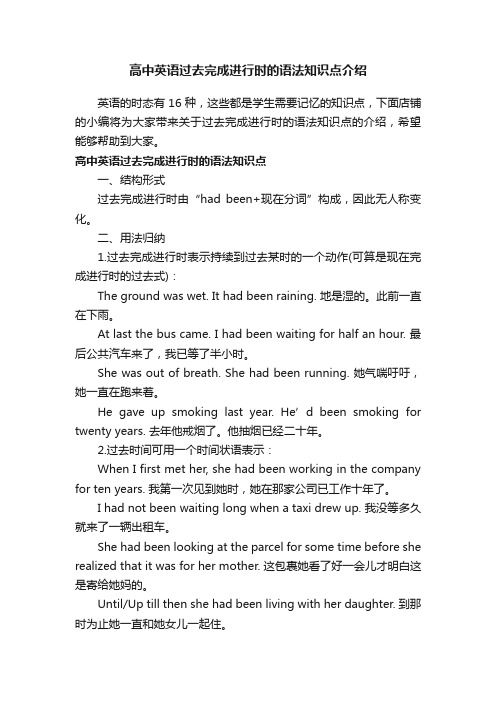
高中英语过去完成进行时的语法知识点介绍英语的时态有16种,这些都是学生需要记忆的知识点,下面店铺的小编将为大家带来关于过去完成进行时的语法知识点的介绍,希望能够帮助到大家。
高中英语过去完成进行时的语法知识点一、结构形式过去完成进行时由“had been+现在分词”构成,因此无人称变化。
二、用法归纳1.过去完成进行时表示持续到过去某时的一个动作(可算是现在完成进行时的过去式):The ground was wet. It had been raining. 地是湿的。
此前一直在下雨。
At last the bus came. I had been waiting for half an hour. 最后公共汽车来了,我已等了半小时。
She was out of breath. She had been running. 她气喘吁吁,她一直在跑来着。
He gave up smoking last year. He’d been smoking for twenty years. 去年他戒烟了。
他抽烟已经二十年。
2.过去时间可用一个时间状语表示:When I first met her, she had been working in the company for ten years. 我第一次见到她时,她在那家公司已工作十年了。
I had not been waiting long when a taxi drew up. 我没等多久就来了一辆出租车。
She had been looking at the parcel for some time before she realized that it was for her mother. 这包裹她看了好一会儿才明白这是寄给她妈的。
Until/Up till then she had been living with her daughter. 到那时为止她一直和她女儿一起住。
英语十六种时态归纳表

英语十六种时态归纳表以下是英语中的16种时态的归纳表:时态描述例句:--: :--: :--:现在简单时描述现在的动作或状态 I eat an apple every day.过去简单时描述过去的动作或状态 They built a bridge last year.将来简单时描述未来的动作或状态 Next week, we will visit the museum.现在进行时描述现在正在进行的动作 He is eating an apple.过去进行时描述过去正在进行的动作 They were building a bridge at this time yesterday.将来进行时描述未来将进行的动作 Next week, we will be visiting the museum.现在完成时描述到目前为止已经完成的动作或状态 I have eaten an apple today.过去完成时描述到过去某个时间点已经完成的动作或状态 They had built a bridge before the end of last year.将来完成时描述到未来某个时间点将会完成的动作或状态 By next week, we will have visited the museum.现在完成进行时描述从过去某时开始,一直持续到现在并可能继续进行的动作 He has been eating an apple for the past hour.过去完成进行时描述从过去某时开始,一直持续到过去某个时间点并可能已经停止的动作用户端作或状态 They had been building a bridge for several months before it was finished.将来完成进行时描述从未来某个时间点开始,一直持续到未来某个时间点并可能继续进行的动作或状态 By next week, we will have been visiting the museum for several days.现在进行完成时描述一个动作已经持续了一段时间,并且仍在进行中,强调对现在的影响或结果用户端作或状态用户端作或状态。
英语的16种时态归纳
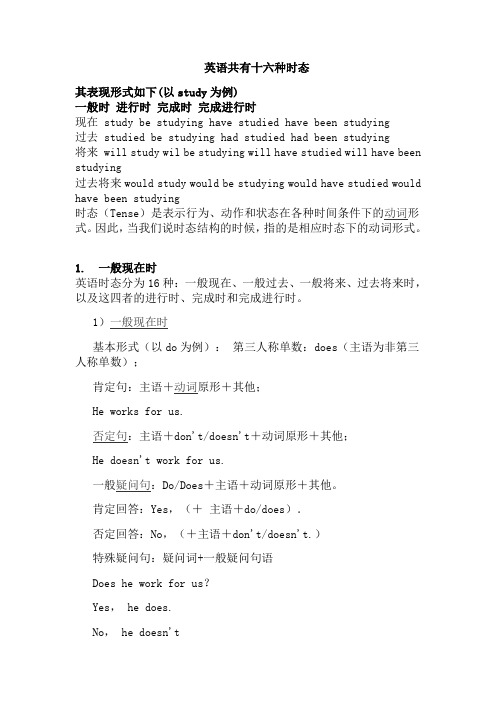
英语共有十六种时态其表现形式如下(以study为例)一般时进行时完成时完成进行时现在 study be studying have studied have been studying过去 studied be studying had studied had been studying将来 will study wil be studying will have studied will have been studying过去将来would study would be studying would have studied would have been studying时态(Tense)是表示行为、动作和状态在各种时间条件下的动词形式。
因此,当我们说时态结构的时候,指的是相应时态下的动词形式。
1. 一般现在时英语时态分为16种:一般现在、一般过去、一般将来、过去将来时,以及这四者的进行时、完成时和完成进行时。
1)一般现在时基本形式(以do为例):第三人称单数:does(主语为非第三人称单数);肯定句:主语+动词原形+其他;He works for us.否定句:主语+don't/doesn't+动词原形+其他;He doesn't work for us.一般疑问句:Do/Does+主语+动词原形+其他。
肯定回答:Yes,(+主语+do/does).否定回答:No,(+主语+don't/doesn't.)特殊疑问句:疑问词+一般疑问句语Does he work for us?Yes, he does.No, he doesn'tWhat does he do for us?He works for us.用法:A) 表示现在发生的动作、情况、状态和特征。
B) 习惯用语。
C) 经常性、习惯性动作。
例:He always helps others. (他总是帮助别人。
英语时态总共有16种

英语时态总共有16种,但是常见的9种,常用8种时态是谓语动词所表示的动作或情况发生时间的各种形式.英语动词有16种时态,但是常见的只有九种:一般现在时、一般过去时、一般将来时、现在进行时、过去进行时、现在完成时、过去完成时,过去将来时,现在完成进行时。
常用的时态只有八种。
一:一般现在时的用法1..概念:经常、反复发生的动作或行为及现在的某种状况1)表示经常性、习惯性的动作;表示现在的状态、特征和真理.句中常用always, usually, often, sometimes, every we ek (day, year, month…), once a week, on Sundays等时间状语。
例如:He goes to school every day.(经常性动作)He is very happy.(现在的状态)The earth moves around the sun.(真理)2)在时间状语从句和条件状语从句中,用一般现在时表示将来.例如:If you come this afternoon,we' ll have a meeting.When I graduate,I’ll go to the countryside.3)有时这个时态表示按计划、规定要发生的动作,(句中都带有时间状语)但限于少数动词如begin,come,leave,go,arrive,start,stop,return,open,close等.例如:The meeting begins at seven.The train starts at nine in the morning.4)表示状态和感觉的动词,如be,like,hate,think,remember,find,sound等常用一般现在时.例如:I like English very much.The story sounds very interesting.5)书报的标题,小说等情节介绍常用一般现在时.2.基本结构:动词原形(如主语为第三人称单数,动词上要加(e)S)。
英语时态语法总结归纳

英语时态语法总结归纳时态是英语中一个重要的语法范畴,它表示不同时间发生的动作或存在的状态以及动作发生或存在的方式。
小编在这里整理了相关知识,快来学习学习吧!英语时态语法总结归纳一般完成进行完成进行现在现在一般时do现在完成时have done现在进行时is doing现在完成进行时have been doing过去过去一般时did过去完成时had done过去进行时was doing过去完成进行时had been doing将来将来一般时will do将来完成时will have done将来进行时will be doing将来完成进行时will have been doing 过去将来过去将来一般时would do过去将来完成时would have done过去将来进行时would be doing过去将来完成进行时would have been doing1. 一般现在时用法:A) 表示现在发生的动作、情况、状态和特征。
B) 习惯用语。
C) 经常性、习惯性动作。
例:He always helps others. (他总是帮助别人。
)D) 客观事实和普遍真理。
尤其要注意,如果前后文不是一般现在时,则无法保持主句、从句时态一致。
E) 表示一个按规定、计划或安排要发生的动作,(仅限于某些表示来、去、动、停、开始、结束、继续等的动词)可以与表示未来时间的状语搭配使用。
常见的用法是:飞机、火车、轮船、汽车等定期定点运行的交通方式。
例:The next train leaves at 3 oclock this afternoon.(下一趟火车今天下午3点开车。
)How often does this shuttle bus run? (这班车多久一趟?)F) 在时间和条件状语从句里经常用一般现在(有时也用现在完成时)表示将来事情。
例:When you have finished the report, I will have waited for about 3 hours.(等你完成这份报告的时候,我就已经等了将近3个小时了。
英语16种时态表格总结
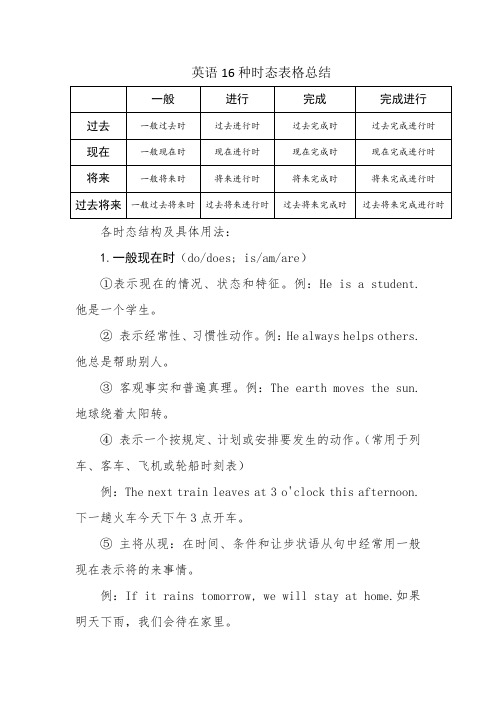
英语16种时态表格总结各时态结构及具体用法:1.一般现在时(do/does; is/am/are)①表示现在的情况、状态和特征。
例:He is a student.他是一个学生。
②表示经常性、习惯性动作。
例:He always helps others.他总是帮助别人。
③客观事实和普遍真理。
例:The earth moves the sun.地球绕着太阳转。
④表示一个按规定、计划或安排要发生的动作。
(常用于列车、客车、飞机或轮船时刻表)例:The next train leaves at 3 o'clock this afternoon.下一趟火车今天下午3点开车。
⑤主将从现:在时间、条件和让步状语从句中经常用一般现在表示将的来事情。
例:If it rains tomorrow, we will stay at home.如果明天下雨,我们会待在家里。
2.现在进行时(am/is/are doing)①表示此时此刻正在发生的事情。
例:He is listning to the music now.他现在正在听音乐。
②表示目前一段时间内一直在做的事情,但不一定此时此刻正在做。
例:I am studying computer this term.这个学期我一直在学习计算机。
③现在进行时可以表示将来的含义。
瞬时动词的进行一定表将来。
例:I am leaving.我要离开了。
持续动词的进行只有有将来的时间状语或有将来语境中才表将来。
例:I am travelling next month.下个月我要去旅行。
④现在进行时与频度副词连用,表示说话者或褒义或贬义的感情色彩。
例:He is always helping others.他总是帮助别人。
(褒义)3.过去进行时(was/ were doing)①表示在过去一个具体的时间正在发生的动作。
例:Mary was listening to light music 10 minutes ago.10分钟前,玛丽正在听轻音乐。
英语语法总结归纳

英语语法总结归纳英语语法总结归纳1、现在进行时Look, Listen是标志,现在进行正发生;有时now在句中现,“be+v-ing”时态成。
若问be用何形式,须看主语数、人称。
三单is我am,你和复数are紧随 (即:He / She is, I am. We, you,they 后are紧跟)。
v-ing形式更好记,三种构成要分清。
一般问句be提前,be后not否定成!2、一般现在时一般现在时态中,动词一般用原形。
表述事实讲真理,习惯动作常发生。
动词词尾加-s(es),只表单数三人称。
若变一般疑问句,得看句型是哪种。
系表结构和there be, be放句首即完成;若遇实义动词句,do或does莫忘记!3、一般过去时肯定句的过去式。
规则动词加ed,不规则的必须记。
否定形式疑问句,没有be加did。
如把did加在前,动词还要归原形。
4、基数词变序数词基变序,很容易,一二三,特殊记,th从四起。
八去t来九去e,遇到ve,f 替,ty变为tie,后加th莫迟疑,若想表示几十几,只变个位就可以。
5、时间介词巧记歌年、月、季节前用in,(如:in 2008, in September, in spring)日期前面行不通。
遇到几号或星期改用on来做代替, (如:on January 1,onWedesday)上午、下午、晚上仍用in。
(如:in the morning/afternoon/evening)若是某日上下午,也是用on才能行。
(如:on theevening of the Mid-autumn Day)正午、夜里用at, (如:at noon, at night)时、分用法也同理。
(如:, at two, at two)如若“差”点须加to, (如:two to two)如若“过”点改past。
(如:half past one)多说勤练牢牢记,学好英语非儿戏。
6、特殊的形容词、副词的比较级、最高级一分为二是三个, (指同一个形容词原形但是有两种比较级和最高级形式)两个“远”“来”一个“老”。
一般现在时--一般过去时---现在进行时--过去进行时归纳总结
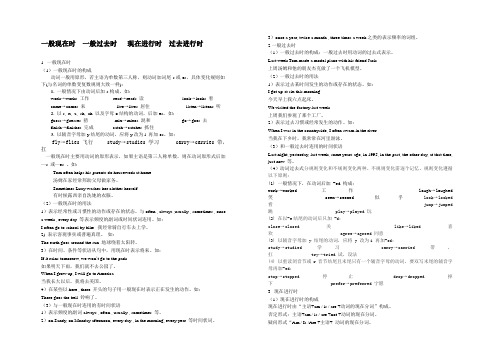
一般现在时一般过去时现在进行时过去进行时1. 一般现在时(1)一般现在时的构成动词一般用原形,若主语为单数第三人称,则动词加词尾-s或-es,具体变化规则如下(与名词的单数变复数规则大致一样):1.一般情况下由动词后加-s构成。
如:work→works 工作read→reads 读look→looks 看come→comes 来live→lives 居住listen→listens 听2.以s, x, z, sh, ch 以及字母o结构的动词,后加-es。
如:guess→guesses 猜mix→mixes 混和go→goes 去finish→finishes 完成catch→catches 抓住3.以辅音字母加y结尾的动词,应将y改为i 再加-es。
如:fly→flies 飞行study→studies 学习carry→carries 带,扛一般现在时主要用动词的原形表示,如果主语是第三人称单数,则在动词原形式后加—s 或—es 。
如:Tom often helps his parents do housework at home.汤姆在家经常邦助父母做家务。
Sometimes Lucy washes her clothes herself.有时候露西亲自洗她的衣服。
(2)一般现在时的用法1)表示经常性或习惯性的动作或存在的状态。
与often , always ,usually , sometimes , once a week , every day 等表示频度的副词或时间状词连用。
如:I often go to school by bike. 我经常骑自行车去上学。
2) 表示客观事实或普遍真理。
如:The earth goes around the sun .地球绕着太阳转。
3)在时间、条件等状语从句中,用现在时表示将来。
如:If it rains tomorrow, we won’t go to the park.如果明天下雨,我们就不去公园了。
英语时态总结

英语时态总结一般现在时:主语+谓语(动词原形)+宾语例句:I play football现在进行时:主语+be动词+谓语(动词现在分词)+宾语例句:I am playing football一般过去时:主语+谓语(动词过去式)+宾语+其他例句:I played football yesterday时态是英语学习中一个至关重要的内容,广大初中学生在实际运用时,往往对时态总是倍感棘手,下面我们就归纳复习一下这几种时态。
一、一般现在时:概念:经常、反复发生的动作或行为及现在的某种状况。
时间状语:always, usually, often, sometimes, every week (day, year, month…), once a week,on Sundays, etc.基本结构:①be动词;②行为动词否定形式:①am/is/are+not;②此时态的谓语动词若为行为动词,则在其前加don't,如主语为第三人称单数,则用doesn't,同时还原行为动词。
一般疑问句:①把be动词放于句首;②用助动词do提问,如主语为第三人称单数,则用does,同时,还原行为动词。
例句:The students study very hard. 学生们学习很认真。
She has a dictionary. 她有一本字典。
二、一般过去时:概念:过去某个时间里发生的动作或状态;过去习惯性、经常性的动作、行为。
时间状语:ago, yesterday, the day before yesterday, last week(year, night, month…), in 1989, just now, at the age of 5, one day, long long ago, once upon a time, etc.基本结构:①be动词;②行为动词否定形式:①was/were+not;②在行为动词前加didn't,同时还原行为动词。
(完整版)16种英语时态总结归纳
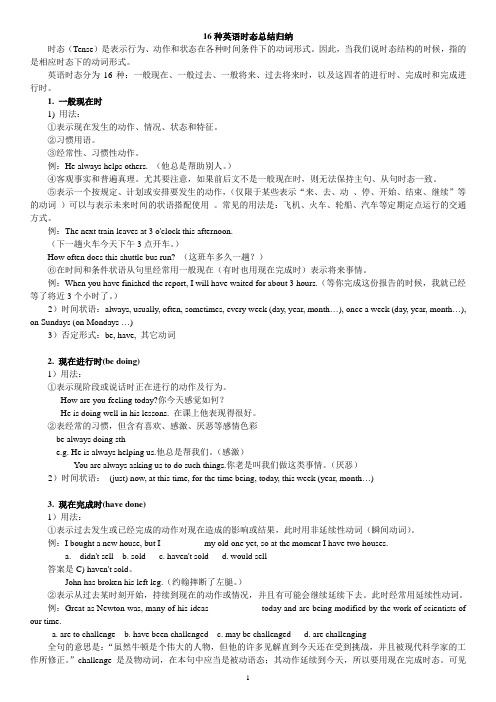
16种英语时态总结归纳时态(Tense)是表示行为、动作和状态在各种时间条件下的动词形式。
因此,当我们说时态结构的时候,指的是相应时态下的动词形式。
英语时态分为16种:一般现在、一般过去、一般将来、过去将来时,以及这四者的进行时、完成时和完成进行时。
1. 一般现在时1) 用法:①表示现在发生的动作、情况、状态和特征。
②习惯用语。
③经常性、习惯性动作。
例:He always helps others. (他总是帮助别人。
)④客观事实和普遍真理。
尤其要注意,如果前后文不是一般现在时,则无法保持主句、从句时态一致。
⑤表示一个按规定、计划或安排要发生的动作,(仅限于某些表示“来、去、动、停、开始、结束、继续”等的动词)可以与表示未来时间的状语搭配使用。
常见的用法是:飞机、火车、轮船、汽车等定期定点运行的交通方式。
例:The next train leaves at 3 o'clock this afternoon.(下一趟火车今天下午3点开车。
)How often does this shuttle bus run? (这班车多久一趟?)⑥在时间和条件状语从句里经常用一般现在(有时也用现在完成时)表示将来事情。
例:When you have finished the report, I will have waited for about 3 hours.(等你完成这份报告的时候,我就已经等了将近3个小时了。
)2)时间状语:always, usually, often, sometimes, every week (day, year, month…), once a week (day, year, month…), on Sundays (on Mondays …)3)否定形式:be, have, 其它动词2. 现在进行时(be doing)1)用法:①表示现阶段或说话时正在进行的动作及行为。
英语十六种时态归纳表
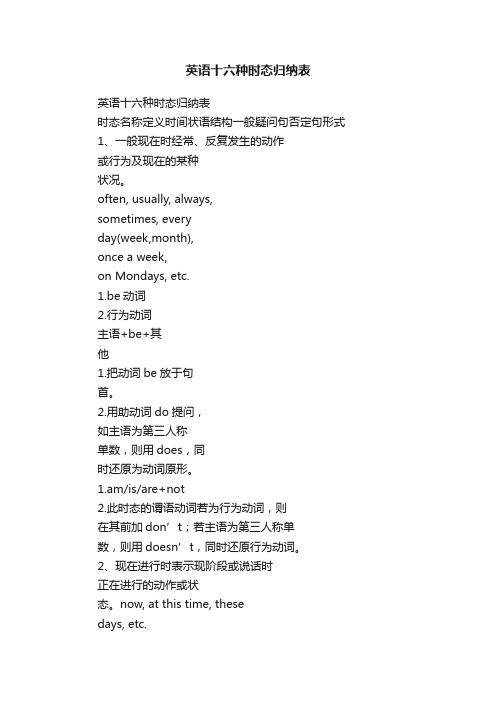
英语十六种时态归纳表英语十六种时态归纳表时态名称定义时间状语结构一般疑问句否定句形式1、一般现在时经常、反复发生的动作或行为及现在的某种状况。
often, usually, always,sometimes, everyday(week,month),once a week,on Mondays, etc.1.be动词2.行为动词主语+be+其他1.把动词be放于句首。
2.用助动词do提问,如主语为第三人称单数,则用does,同时还原为动词原形。
1.am/is/are+not2.此时态的谓语动词若为行为动词,则在其前加don’t;若主语为第三人称单数,则用doesn’t,同时还原行为动词。
2、现在进行时表示现阶段或说话时正在进行的动作或状态。
now, at this time, thesedays, etc.主语+am/is/are+doing把be动词放在句首。
主语+am/ is/ are +not +doing 3、一般过去时过去某个时间里发生的动作或状态;过去习惯性、经常性的动作、行为。
ago, yesterday, lastweek(month, year…), in2000, just now, one day,long long ago, etc.1.was/were2.行为动词过去式1.把was或were放于句首。
2.用助动词did提问,同时还原为动词原形。
1.主语+was/were+ not2.在行为动词前加do在其前加didn’t,同时还原行为动词。
4、过去进行时表示过去某段时间或某一时刻正在发生或进行的动作或行为。
at this time yesterday或以when引导的谓语动词是一般过去时的时间状语等。
主语+was/were+ doing把was或were放在句首。
主语+was/ were+ not+ doing5、现在完成时过去发生或已经完成的动作对现在造成的already, yet, just, ever,never, before, recently,inhave/ has+done把have或has放在句首。
英语16种时态结构归纳
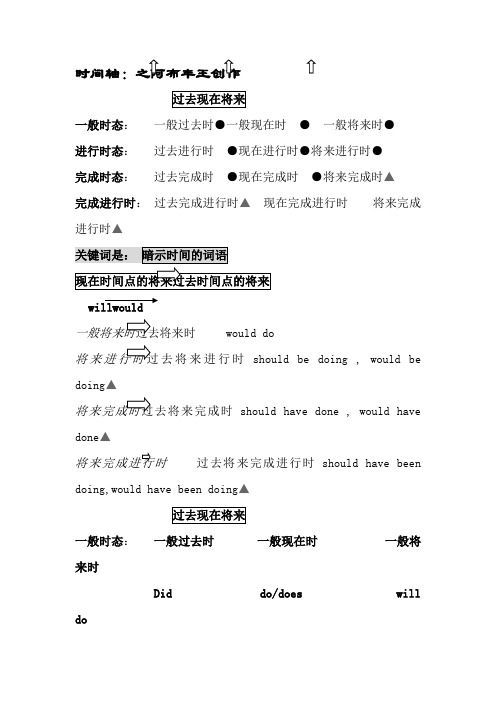
一般时态:一般过去时●一般现在时●一般将来时●进行时态:过去进行时●现在进行时●将来进行时●完成时态:过去完成时●现在完成时●将来完成时▲完成进行时:过去完成进行时▲现在完成进行时将来完成进行时▲willwouldwould do将来进去将来进行时should be doing , would be doing▲should have done , would have done▲过去将来完成进行时should have been doing,would have been doing▲一般时态:一般过去时一般现在时一般将来时Did do/does will do进行时态:过去进行时现在进行时将来进行时was/were doing am/is/are doing will be doing完成时态:过去完成时现在完成时将来完成时had done have/has done will have done完成进行时:过去完成进行时现在完成进行时将来完成进行时Had been doing have/has been doing will have beendoing暗示动作或状态发生时间和方式的动词形式语。
间段)间点). . . . . . . . . .. . ..完成时态:截止到某一个时间点,某个动作已经完成(时间点)(时间点)一般过去时She got up early, fetched water, cleaned the room and then went out for a walk陈述已做的事情一般现在时The next train leaves at 3 o'clock this afternoon 陈述火车下午三点发车这件事儿一般将来时He will come back soon.叙述将要发生的事情现在完成时John has broken his left leg强调已发生过去完成时By the time my parents reached home yesterday, I had cooked the dinner already直至到昨天父母回来的那一刻,我已经把晚餐准备好了将来完成时现在完成进行时We have been working on this project for over a month now 到现在时间点已完成一部分,另外的在今后在完成将来完成进行时By the end of next month, the project will have been being worked for 3 years.到下个月的一个时间点已完成部分,并在将来的一段时间内继续过去完成进行时:I had been looking for it for days before I found it. 这东西我找了好多天才找着的1.I can guess you were in a hurry.You____your sweater inside out.A.had wornB.woreC.were wearingD.are wearing2.—— We _____ that you would fix the TV set this week.—— I’m sorry.I _____ to fix it this week, but I’ve been too busy.A.had expected;had intendedB.are expecting;had intendedC.expect; intendD.expected; intend3.He will stop showing off, if no notice _____ of him.A.is takenB.will be takenC.takesD.has taken4.——It is said that another new car factory_____now.—— Yeah.It _____one and a half years.A.is building; takesB.is being built; will takeC.is built; will takeD.is being built; takes5.——I’m sorry, but I shouldn’t have been so rude to you.—— You _____ your temper but that’s OK.A.have lostB.had lostC.did loseD.were losing6.—— Why? Tom, your shirt is so dirty!—— Mum, I _____ my storeroom downstairs。
初中英语必考时态知识点归纳总结

初中英语必考时态知识点归纳总结时态是在英语学习中至关重要的一个内容,为了帮助初中的学生们学习,小编为大家总结了初中阶段学习的时态。
希望能对大家有所帮助!初中英语必考时态知识点过去将来时1. 概念:立足于过去某一时刻,从过去看将来,常用于宾语从句中。
2. 时间状语:the next day(morning, year),the following month(week),etc.3. 基本结构:①was/were/going to + do;②would + do.否定形式:①was/were/not + going to + do;②would + not + do.一般疑问句:①was或were放于句首;②would 提到句首。
4. 用法1) “would+动词原形”常表示主观意愿的将来。
例如:He said he would come to see me.他说他要来看我。
He told me he would go to Beijing.他告诉我他将去北京。
2) “was/ were+going to+动词原形”常表示按计划或安排即将发生的事。
例如:She said she was going to start off at once.她说她将立即出发。
I was told that he was going to return home.有人告诉我他准备回家。
此结构还可表示根据某种迹象来看,很可能或即将发生的事情。
例如:It seemed as if it was going to rain.看来好像要下雨。
3) come, go, leave, arrive, start等瞬时动词动词可用过去进行时表示过去将来的含义。
例如:He said the train was leaving at six the next morning.他说火车将于第二天早晨六点离开。
She told me she was coming to see me.她告诉我她要来看我。
2012中考英语语法重点动词的时态4
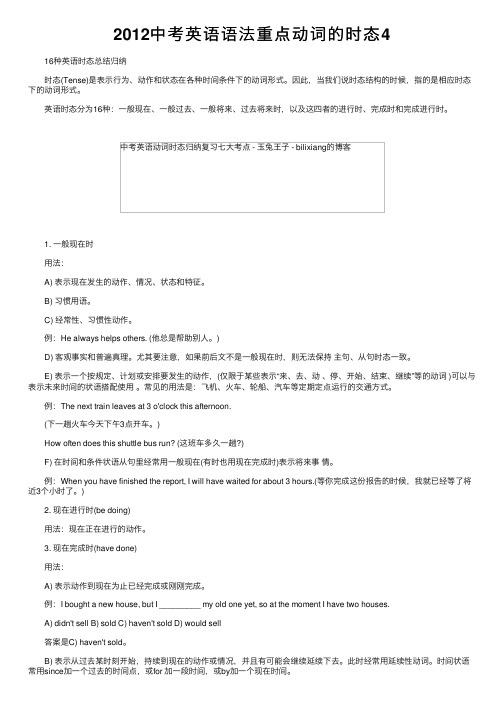
2012中考英语语法重点动词的时态4 16种英语时态总结归纳 时态(Tense)是表⽰⾏为、动作和状态在各种时间条件下的动词形式。
因此,当我们说时态结构的时候,指的是相应时态下的动词形式。
英语时态分为16种:⼀般现在、⼀般过去、⼀般将来、过去将来时,以及这四者的进⾏时、完成时和完成进⾏时。
中考英语动词时态归纳复习七⼤考点 - ⽟兔王⼦ - bilixiang的博客 1. ⼀般现在时 ⽤法: A) 表⽰现在发⽣的动作、情况、状态和特征。
B) 习惯⽤语。
C) 经常性、习惯性动作。
例:He always helps others. (他总是帮助别⼈。
) D) 客观事实和普遍真理。
尤其要注意,如果前后⽂不是⼀般现在时,则⽆法保持主句、从句时态⼀致。
E) 表⽰⼀个按规定、计划或安排要发⽣的动作,(仅限于某些表⽰“来、去、动、停、开始、结束、继续”等的动词 )可以与表⽰未来时间的状语搭配使⽤。
常见的⽤法是:飞机、⽕车、轮船、汽车等定期定点运⾏的交通⽅式。
例:The next train leaves at 3 o'clock this afternoon. (下⼀趟⽕车今天下午3点开车。
) How often does this shuttle bus run? (这班车多久⼀趟?) F) 在时间和条件状语从句⾥经常⽤⼀般现在(有时也⽤现在完成时)表⽰将来事情。
例:When you have finished the report, I will have waited for about 3 hours.(等你完成这份报告的时候,我就已经等了将近3个⼩时了。
) 2. 现在进⾏时(be doing) ⽤法:现在正在进⾏的动作。
3. 现在完成时(have done) ⽤法: A) 表⽰动作到现在为⽌已经完成或刚刚完成。
例:I bought a new house, but I _________ my old one yet, so at the moment I have two houses. A) didn't sell B) sold C) haven't sold D) would sell 答案是C) haven't sold。
高考英语时态总结-全

V
be+ V-ing
进 行
完 成
have+ P.P
have been
have worked has worked have been working has been working
had worked
had been working
完成 进行
+V-ing
shall have should have been working been working
进行----表示在某一时刻或一段时间正在发生 的动作。 某一时刻正在发生: Jane is writing a letter. 某一段时间正在发生: Now I am working in IBM.
时态表示的4种状态
完成----在某一时刻前已经做完的动作或一直 持续的状态。 某时刻前完成的动作: He has graduated from middle school. 某一时刻前已一直持续的状态: She has been a nurse for two years.
He wrote many plays when he was at college.
(写剧本是他过去做的事情) He has written many plays. (这意味着他是剧作家)
I saw Hero last year.
(看《英雄》的时间是去年,与现在无关) I have seen Hero before. (强调现在知道这部电影的内容。以前看过,但 “以前”是表示一个与现在有联系的过去时间,
现在
时间
状态 基本结构 一 般 进 行 完 成 do
过去 将来 熟记基本结构,灵活应用规则 will do should do will be doing should be doing will have done
- 1、下载文档前请自行甄别文档内容的完整性,平台不提供额外的编辑、内容补充、找答案等附加服务。
- 2、"仅部分预览"的文档,不可在线预览部分如存在完整性等问题,可反馈申请退款(可完整预览的文档不适用该条件!)。
- 3、如文档侵犯您的权益,请联系客服反馈,我们会尽快为您处理(人工客服工作时间:9:00-18:30)。
时间轴:过去现在将来一般时态:一般过去时●一般现在时●进行时态:过去进行时●现在进行时●完成时态:过去完成时●现在完成时●完成进行时:过去完成进行时▲现在完成进行时关键词是:表示时间的词语一般将来时●将来进行时●将来完成时▲将来完成进行时▲现在时间点的将来过去时间点的将来will would一般将来时过去将来时would do将来进行时过去将来进行时should be doing , would be doing▲将来完成时过去将来完成时should have done , would have done▲将来完成进行时过去将来完成进行时 should have been doing, would have been doing ▲过去现在将来一般时态:一般过去时一般现在时一般将来时Did do/does will do进行时态:过去进行时现在进行时将来进行时was/were doing am/is/are doing will be doing完成时态:过去完成时现在完成时将来完成时had done have/has done will have done完成进行时:过去完成进行时现在完成进行时将来完成进行时Had been doing have/has been doing will have been doing动词时态:表示动作或状态发生时间和方式的动词形式语态:描述句子中动词和参与此动作之主语之间关系的一个术语。
一般时态:叙述、描述或者经常发生的动作等(时间段)进行时态:在某时间点某个动作正在发生(时间点)..............完成时态:截止到某一个时间点,某个动作已经完成(时间点)完成进行时:截至某个时间点该动作已经发生,并将延续下去(时间点)一般过去时She?got?up?early,?fetched?water,?cleaned?the?room?and?then?went?out?for?a?walk 陈述已做的事情一般现在时The next train leaves at 3 o'clock this afternoon 陈述火车下午三点发车这件事儿一般将来时He will come back soon . 叙述将要发生的事情现在完成时John has broken his left leg 强调已发生过去完成时By the time my parents reached home yesterday, I had cooked the dinner already直至到昨天父母回来的那一刻,我已经把晚餐准备好了将来完成时 Before long he will have forgotten all about the matter. 过了将来的一个时间点后他就会忘记某事现在完成进行时We have been working on this project for over a month now 到现在时间点已完成一部分,另外的在今后在完成将来完成进行时By the end of next month, the project will have been being worked for 3 years. 到下个月的一个时间点已完成部分,并在将来的一段时间内继续过去完成进行时:I had been looking for it for days before I found it.这东西我找了好多天才找着的1.I can guess you were in a hurry.You____ your sweater inside out.A.had wornB.woreC.were wearingD.are wearing2.——We _____that you would fix the TV set this week.——I’ m sorry.I _____to fix it this week, but I ’ ve been too busy.A.had expected ; had intendedB.are expecting ; had intendedC.expect;intendD.expected;intend3.He will stop showing off, if no notice_____of him.4.—— It is said that another new car factory _____ now.—— Yeah.It _____ one and a half years.A.is building ; takesB.is being built ; will takeC.is built;will takeD.is being built ; takes5.—— I ’ m sorry, but I shouldn’ t have been so rude to you.—— You _____ your temper but that ’ s OK.A.have lostB.had lostC.did loseD.were losing6.—— Why? Tom, your shirt is so dirty!—— Mum, I _____ my storeroom downstairs 。
16.I’ ve won a holiday for two to Florida.I_____my mum.A.takeB.am takingC.have takenD.will have taken10.The traffic in our city is already good and it___even better.11.—— Has Jack finished his homework yet?—— I have no idea ; he ___ it this morning.A.was doingB.had been doingC.has doneD.did12.——I will come to attend your lecture at 10:00 tomorrow.——I’ m sorry, by then my lecture will have ended and I ___ my guests in my office.A.is being metB.will meetC.will be meetingD.will have met13.—— Alice came back home the day before yesterday.—— Really ? Where _____ ?A.has she beenB.had she beenC.has she goneD.had she gone14.John and I___ friends for eight years.We first got to know each other at a Christmas party.But we _____ each other a couple of times before that.A.had been; have metB.have been; have metC.had been; had metD.have been; had met15.I ____ping-pong quite well, but I haven ’ t had time to play since the new year.A.will playB.have playedC.playedD.play1.D。
can guess 这一现在猜测是建立在眼前所见情景的基础上的,故用现在进行时。
2.A。
expect, intend, want, wish, hope, plan 等动词的过去完成式可表示过去未曾实现的想法、愿望、打算等。
if 从3.A。
如主句用将来时,在时间、条件和让步状语从句中要用一般现在时表示将来。
又因句是 take notice of... 的被动语态结构,故选A。
4.B。
根据主语与build 之间的被动关系和now,可知要选现在进行时的被动语态;因工厂正在修建,花费一年半应指将来。
5.C。
shouldn’t have done 表示“过去本不应”。
You did lose your temper 是You lost your temper 的强调形式。
6.D。
现在完成进行时表示从过去某时到现在一直在进行的动作。
7.B。
句意为:他们(现在)不愿买新衣服,因为他们在攒钱买电视。
由此可见,攒钱是现阶段正在进行的动作。
8.C。
担心是从过去某时到说话时为止一直在进行的动作,用现在完成时;expect 是在过去某一段时间里(整个晚上)正在进行的动作,故用过去进行时。
9.B。
论文已完成,花费一个月时间应指过去;某事花费某人多少时间用sth.takes sb.some time 结构。
10.D。
交通现在已经好了,在此基础上正在变得更好。
11.A。
题干没有构成“过去的过去”,不可选 B。
如选 C、D 则表示动作已完成,与have no idea 相矛盾。
过去进行时表示过去某段时间或某一时刻正在进行的动作,不涉及结果,正好附合题干语境。
12.C。
by then 是指将来的时间状语,排除A。
再由句意可知, meet 指的是到了十点钟时将正在进行的动作。
13.B。
问句问的是前天回来之前去了哪儿,故用过去完成时。
注意had gone 表示人未回来,与第一句相矛盾。
14.D。
for +时间段表示从过去某时延续至今的动作或状态,用现在完成时; meet 发生在 got to know 这一过去动作之前,用过去完成时。
15.D。
用一般现在时表示现在的特征或状态。
16.B。
come, go, leave, arrive, take 等动词常用进行时表砂将来。
17.D。
表示过去没有做某事应用去时。
又因句子没有"过去正在进行 " 之意,帮排除 A。
18.B。
问对方 "去了哪里 " ,指的是从过去某时到现在为止的动作,用现在完成时;第二个空格是与过去事实相反的虚拟语气和主句,条件状语从句If I hadn’ t got stuck in the heavy traffic 被省略。
19.C。
在一个国际会议上被介绍显然发生在过去。
20.B。
此句为复杂特殊疑问句结构,即“疑问词+do you think (believe, suppose, expect, imagine, say, consider, guess等)+其它(陈述语序)?”。
